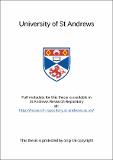Ulrich von Hutten : knight, humanist and reformer, 1519-1520
Abstract
This thesis examines the thought of the knight, humanist and patriotic reformer Ulrich von Hutten in 1519 and 1520. It focuses on four of his Latin dialogues: Arminius. Bulla vel Bullicida. Monitor Primus and Monitor Secundus. Only the first has previously been studied in any detail, and its treatment in this thesis differs from earlier work in using it to illustrate Hutten's thought and priorities rather than the development of German patriotism and the 'Arminius cult'. Original translations of all four dialogues are included in the appendices. The years 1519 and 1520 are examined here as they were a crucial turning-point in Hutten's career. Until then, he was well known as a colourful and brilliant humanist and as a friend of Erasmus. However, these two years saw dramatic changes in Hutten's life. He became far more extreme in his German patriotism, adopted Martin Luther's cause, became disillusioned with the Holy Roman Emperor Charles V, wrote such biting polemic against the Church that it condemned him along with Luther, and sowed the seeds of his involvement in the Knights' Revolt of 1522-1523. These changes would make him a political outcast, and lead to his death in exile at the age of thirty-five. Together with selections from Hutten's Latin and German correspondence and poetry, the dialogues reveal much about Hutten's thought on important themes such as liberty, religion and patriotism during this crucial time. They dispel the traditional, caricatured images of Hutten (patriotic hero or violent xenophobe). The thesis also examines the complex influences at work in his childhood and early career, which brought him from a privileged background to the impossible position that he occupied at the end of 1520.
Type
Thesis, PhD Doctor of Philosopy
Collections
Items in the St Andrews Research Repository are protected by copyright, with all rights reserved, unless otherwise indicated.

